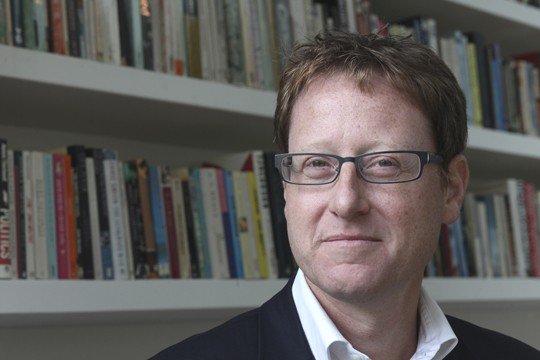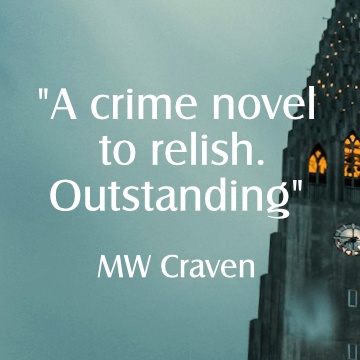 Sam Bourne is the pen name of Jonathan Freedland, an astute Guardian journalist who has turned his hand to fiction with great success. His latest book is called Pantheon and it’s a carefully researched piece set in 1940, when Britain was in its hour of need. Oxford psychology don James Zennor, an idealist and veteran of the Spanish Civil War, comes home from his morning rowing to find his wife and child have disappeared. There’s a note saying she still loves him, but he has no idea where they’ve gone. He goes into a rage, downs more than a few glasses of whiskey, and then starts his search for them. Eventually, he discovers his little boy was one of 125 children evacuated from Oxford to Yale. He sets off for America to find them and uncovers a conspiracy run by the intellectual elite. The book is mainly a historical thriller, but with a big dose of crime thrown in thanks to its mystery and conspiracy elements. We talked to the author about how he created Pantheon.
Sam Bourne is the pen name of Jonathan Freedland, an astute Guardian journalist who has turned his hand to fiction with great success. His latest book is called Pantheon and it’s a carefully researched piece set in 1940, when Britain was in its hour of need. Oxford psychology don James Zennor, an idealist and veteran of the Spanish Civil War, comes home from his morning rowing to find his wife and child have disappeared. There’s a note saying she still loves him, but he has no idea where they’ve gone. He goes into a rage, downs more than a few glasses of whiskey, and then starts his search for them. Eventually, he discovers his little boy was one of 125 children evacuated from Oxford to Yale. He sets off for America to find them and uncovers a conspiracy run by the intellectual elite. The book is mainly a historical thriller, but with a big dose of crime thrown in thanks to its mystery and conspiracy elements. We talked to the author about how he created Pantheon.
Let’s start with James Zennor. He’s clearly brave and full of willpower, but with those qualities come negative characteristics like his anger. What did you want to explore with him?
Well, he has seen at close hand a very bitter war, he was violently injured himself and lost a very close friend, and so the book is exploring post traumatic stress before we had the term post traumatic stress. As well, the idea of looking at the Second World War from the point of view of those who were left behind, I think that is interesting because when we talk about left behind we think about the children who were evacuees, or women, or occasionally about the elderly. But what would it have been like to be a young man who by rights should have served but for whatever reason did not? I think the guilt and shame of that really interested me a lot.
Tell me about why you chose to focus on the political aspects of the War?
I do in my day job write about politics and I think we have so bathed the Second World War period in a kind of righteous glow we have failed to see that like any episode in human history this was intensely political and there were different sides, even in Britain and America. By picking the year 1940 you see the contrast between Britain that is fighting for its very life, and meanwhile across the Atlantic an America that is prosperous and peaceful and not at war, and moreover debating very strenuously whether it should go anywhere near this war. At the time I set the novel there was probably a majority for staying out of the war and that is something that is slightly glossed over by Americans now who prefer a kind of Saving Private Ryan version of their history.
 Our readers love crime fiction, what do you hope they’ll get out of Pantheon?
Our readers love crime fiction, what do you hope they’ll get out of Pantheon?
I hope they will find here a lot to appeal to them. There is a fundamental mystery from the outset which is the disappearance of a man’s wife and child. There is also at a crucial point in the story an unexplained death – perhaps a murder – and we do have a hero to work out how this has happened and to hunt down the culprit. But I also hope it will open up to them a fresh angle on what is an absolutely defining part of our national story which is the events of 1940. I’ve written a piece in today’s Spectator suggesting that 1940 is for modern Britain what 1776 is for America and what 1798 is to France. The story that has grown up around it is kind of a creation myth about Churchill and about the Battle of Britain, but there is much more to it than we realise and it is much more intriguing, much more morally complex. Some of the stories in the book which are told to be thrilling will shock readers when they discover that there is a huge amount of documented truth behind them.
So, the conspiracy James fights against, which moved those 125 children of Britain’s top intellectuals to Yale, is not just fiction?
The truth behind the story I think is jaw-dropping and I don’t think people would have appreciated how deep this stuff ran. Ideas that we would now recoil from and regard as horribly close to Nazi-ism were mainstream among British and American intellectuals in the pre-War period. And I’m refering to eugenics, the belief that we could breed a superior class of human being if only we could encourage those branded as ‘superior’ to breed more and if only those deemed ‘inferior’ would breed less, then the quality of the human stock, in the language of the era, would improve. That idea, which we would now shrink from in distaste – if not disgust – was almost the common sense of the age.
By day you’re a journalist and you report and analyse the facts. When you’re writing as Sam Bourne, what are you free to do, and what creativity do you exercise when writing thrillers?
If you want to get a quote in journalism you have to phone the person and speak to them, but in fiction you can make it up! So that’s a great liberation. But they are closer to each other than I had ever realised. What I’ve discovered is readers of thrillers will accept, sometimes, the most wild flights of fancy. They will accept one lone guy defusing the bomb that will blow up at midnight, but immediately the spell will be broken if you suddenly say in a novel that the character boarded the Northern Line at Green Park Station*. They will have the urge to slam the book shut and say: ‘This guy doesn’t know what he’s talking about.’ So what I have discovered is that if you want readers to go with you on a very high concept novel you have to get the rudiments absolutely accurate. For that it means research. I’ve done a huge amount of research for this book. Every detail of it had to be researched because I didn’t know how someone made a telephone call in 1940, what food they ate in 1940 or how they travelled from Oxford to Liverpool in 1940. I had to find all those things out, but the result is that I hope readers will find that the world of 1940 is properly and accurately drawn and therefore they can go with me on this story, which I hope isn’t a complete flight of fancy because it is based on forgotten real parts of the historical record.
Pantheon goes on sale next week from Harper Collins, so watch for our review. You can pre-order your copy below.
*For readers not familiar with London, Green Park is on the Piccadilly line!








